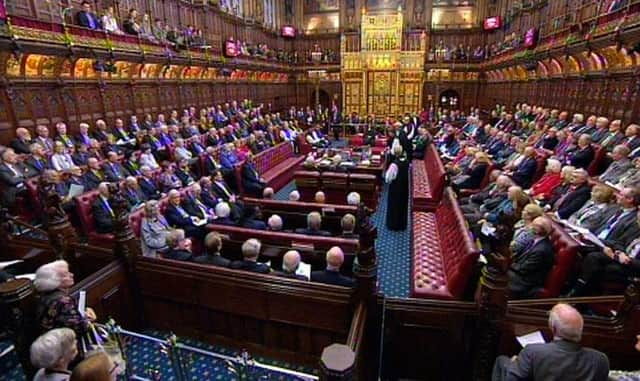House of Lords votes to delay Osborne’s tax credit plans


The defeat is the first of its kind in the Lords for a government in hundreds of years and ends the convention that peers do not vote down Budget policies which have been supported in the Commons.
In a moment of political drama that could spark a new constitutional crisis, peers ignored warnings from the Prime Minister and backed a motion delaying the cuts until the Government responds to analysis of their impact by the Institute for Fiscal Studies and considers “mitigating action”.
Advertisement
Hide AdAdvertisement
Hide AdVoting was 307 to 277, majority 30, for the amendment put down by independent crossbench peer Baroness Meacher at the close of a heated and highly charged debate lasting more than three and a half hours.
They then backed another amendment by Labour designed to force the government to come up with a compensation scheme for those likely to lose out from the tax credit cuts.
Earlier, a Liberal Democrat bid to kill off the cuts altogether was heavily defeated by 310 votes to 99, Government majority 211.
The votes came after Lords leader Baroness Stowell of Beeston warned peers not to challenge the “primacy” of the Commons on financial matters.
At the start of the debate Tory Leader of the House of Lords Lady Stowell said Chancellor George Osborne would listen “very carefully” to concerns about the cuts if the Lords stepped back from rejecting or delaying them.
However, the plea was ignored wiith concerns that low income families will lose on average £1,300 or 10 per cent of their household incomes as a result of the changes.
The vote puts pressure on the Chancellor to change his plans in December’s Autumn statement with many Tory backbenchers now joining opposition parties to express concerns about the impact of the cuts designed to save £4 billion.
During the debate it became clear that the government would even struggle to keep Tory peers on side.
Advertisement
Hide AdAdvertisement
Hide AdFormer Conservative chancellor of the exchequer Lord Lawson has criticised the way cuts to tax credits are being pushed through and has demanded changes.
“I am torn because I believe there are aspects to these measures which need to be reconsidered and indeed changed.
“The great harm, or a great deal of the harm, is at the lowest end and that is what needs to be looked at again. That is what concerns me.
“I think it is perfectly possible with tweaking it to take more from the upper end of the tax credit scale and less from the lower end of the tax credit scale,” Lord Lawson said.
The Tory peer added that the tax credit system had been allowed to “balloon enormously” in recent years and that it was “absurd” to say that a means tested benefit could never be reduced.
Lord Lawson said he backed the Bishop of Portsmouth’s motion expressing regret at the tax credit cuts, but insisted the upper house had no right to vote the measures down.
“This is a budgetary matter, however it is dressed up,” the former chancellor said.
The Archbishop of York, the Most Rev John Sentamu, told peers they would be abrogating their responsibilities by approving regulations without having the full facts before them.
Advertisement
Hide AdAdvertisement
Hide AdHe warned against driving working families into the hands of “loan sharks” by reducing their support. and said many low income households were still worse off than in 2008.
But arguing that peers had no right to delay the measures, Tory former Cabinet minister Lord Fowler said the Conservatives had spelt out their intention to find £12 billion of welfare savings in their 2015 manifesto with more clarity than he could ever remember.
“I don’t think anyone can have imagined how spending on tax credits was to escalate in the way it did,” he said. “But I accept that none of this was the fault of the families who are struggling to make ends meet.”
Lord Fowler said: “We are the unelected House. The Commons is the elected one.” MPs had already voted on the cuts and the unelected House could not “impose its will” on them.
Closing the debate for the Labour Party, Baroness Smith of Basildon condemned the prime minister for talking-up a “phoney” constitutional crisis in order to deflect attention away from the impact of the cuts.
“This goes too far, too quickly, and causes too much harm,” the Baroness told the upper House.
The Labour peer attacked the “threats” and “bullying” deployed by the Tories in order to head off defeat.
“The threats that have been made to the House of Lords as an institution is nothing more than parliamentary bullying.
Advertisement
Hide AdAdvertisement
Hide Ad“We will not exceed our authority, but neither will be cowed into abdicating our responsibilities to hold the Government to account,” Baroness Smith said.
Deputy leader of the Lords Earl Howe said that the impact of the Labour amendment would be the same as the “fatal motion” put forward by the Lib Dems in that it would “thwart” the legislation.
The Tory peer said it was a “false proposition” that the Labour motion would only delay the changes.
“It would not be delayed, it would be thwarted entirely,” the deputy leader of the Lords said, as he warned such a result would put the proposed reforms on a “perpetual treadmill”.